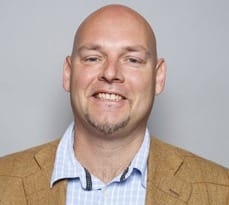From selling ice cream in Yorkshire to planning a life of social entrepreneurship in Africa, David Thomson’s career journey is certainly not without ambition and variety.
 Currently completing the Postgraduate Diploma in Entrepreneurship (PGDE) at the University of Cambridge Judge Business School, the 42-year-old is in the process of swapping his geographically bound business for one where the world (or at least one continent in particular) is his oyster.
Currently completing the Postgraduate Diploma in Entrepreneurship (PGDE) at the University of Cambridge Judge Business School, the 42-year-old is in the process of swapping his geographically bound business for one where the world (or at least one continent in particular) is his oyster.
Tired of a business life shackled to physical premises, products and people, David has been inspired by the endless possibilities of the digital marketplace and has now started several low-maintenance online retail businesses that are giving him the freedom and flexibility to do other things and follow other dreams.
Because going online to build niche businesses is not the ultimate goal but merely a means to an end for the Harrogate man. His real dreams lie much further afield. He sees his future in Africa, where he aims to set up social ventures around clean water, libraries, trade cooperatives and credit unions. He lost his heart to the continent while working in Ghana, setting up similar schemes for the government, and although he came home to build a successful ice-cream and fine foods retail business in Yorkshire, he always knew he would one day return to the continent that inspired him so much.
“My aim is to keep building small, niche retail outlets online that give me an income without having to be tied to one place servicing a physical business, which is incredibly time- and energy-consuming. I want to be able to work from anywhere and to spend a lot of time in Africa. It’s about making a difference and being involved in the future of the continent – which I believe has a great future despite all the challenges.”
During his time on the Cambridge PGDE, he has been especially inspired by ARM. “There’s a hugely successful business that doesn’t actually make anything but designs, licences and sells intellectual property all over the world. I would like to get to the point where there’s nothing to touch in my businesses but they still give me money – and time.”
Realising he needed some help to make his dream happen, David took the advice of a friend and enrolled on the PGDE programme to formally learn the skills of an entrepreneur while progressing his new businesses:
I wanted to study entrepreneurship academically but also work on a practical and real business project and that’s what’s unique about this course. You are challenged to do exactly that – and by entrepreneurs who have built successful businesses themselves.
Most usefully he has learnt to think more deeply and analytically: “My decision-making ability has been sparked into action. I have been challenged to analyse all of my decisions and stress test them properly before putting them into action.”
And then there’s the intangibles:
It’s just great to be around sharp people in an environment where there are ideas swirling around all the time. There’s definitely something in the atmosphere in Cambridge – it’s not at all ivory tower, it’s very practical. An eco-system of learning, doing and applying.

Once immersed in this environment he found himself loathe to leave it and has based himself in the city for the duration of the PGDE programme – and perhaps for longer.
“I would definitely consider relocating to Cambridge. It’s an amazing culture with amazing people and I want to build a team, so this is the best place to find the people I need. I have already hooked up with an ex-Google guy, a web designer and an SEO company to help me grow my online presence and I found them all here.”
It’s a fast-moving, free-wheeling environment that suits a man in a hurry: “My medium-term plan is for the next three to five years, building my businesses. Then I want to be in a position to start making my Africa plan happen.”
Dr Shailendra Vyakarnam, Director of the School’s Centre for Entrepreneurial Learning, said: “I am very inspired by the underlying motive for this business. Some of the really wealthy entrepreneurs first focus on making money and then think about what they might do with their fortune. And when they do share some of their wealth they do so with fanfare. Here is David – setting up a venture in order to do good while doing well.”

